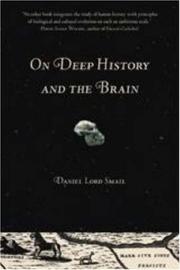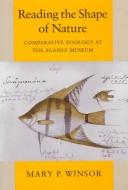| Listing 1 - 9 of 9 |
Sort by
|
Book
Abstract | Keywords | Export | Availability | Bookmark
 Loading...
Loading...Choose an application
- Reference Manager
- EndNote
- RefWorks (Direct export to RefWorks)
Lamarck --- Jean Baptiste Pierre Antoine de Monet de --- 1744-1829
Book
Year: 2012 Publisher: Project Gutenberg
Abstract | Keywords | Export | Availability | Bookmark
 Loading...
Loading...Choose an application
- Reference Manager
- EndNote
- RefWorks (Direct export to RefWorks)
Lamarck --- Jean Baptiste Pierre Antoine de Monet de --- 1744-1829
Book
ISBN: 9789076988993 Year: 2008 Publisher: Amsterdam Natuur & Techniek
Abstract | Keywords | Export | Availability | Bookmark
 Loading...
Loading...Choose an application
- Reference Manager
- EndNote
- RefWorks (Direct export to RefWorks)
Lamarck, de, Jean-Baptiste --- #GGSB: Geschiedenis (Biografieen) --- #GGSB: Wetenschap --- .001.5 onderzoek --- 001 wetenschap --- 575.8 --- 58 <092> --- 59 <092> --- 575.8 Evolution. Origin of species. Phylogeny --- Evolution. Origin of species. Phylogeny --- 58 <092> Botany--Biografieën --- Botany--Biografieën --- Zoologie. Dierkunde--Biografieën --- De Lamarck, Jean-Baptiste --- Fysica --- Geschiedenis --- Natuurkundigen --- Evolutieleer --- 18e eeuw --- 19e eeuw --- 571 --- Lamarck --- Natuurwetenschappen --- Natuurkundige --- Geneeskunde --- Techniek (wetenschap) --- Atlas --- Museum --- Geschiedenis (Biografieen) --- Wetenschap

ISBN: 2271057019 2271128498 9782271057013 Year: 2001 Publisher: Paris: CNRS,
Abstract | Keywords | Export | Availability | Bookmark
 Loading...
Loading...Choose an application
- Reference Manager
- EndNote
- RefWorks (Direct export to RefWorks)
Contrairement à une idée largement répandue, Lamarck ne fut ni un prophète isolé, ni un précurseur de Darwin auquel on aurait omis de rendre justice. Pas davantage un homme dépassé par son époque que les travaux novateurs des Lavoisier, Cuvier, Haüy puis Darwin auraient relégué au second plan. Telle est la thèse soutenue par Pietro Corsi qui montre que le célèbre naturaliste participa pleinement aux grands débats de son temps sur l’extinction des espèces, sur la réforme de l’histoire naturelle, les limites épistémologiques des théories de la Terre ou la méthode naturelle en taxinomie... Un point de vue qui révèle par ailleurs la place des travaux de Lamarck en physique, en chimie, en météorologie et même en «hydrogéologie» dans la construction de l’ambitieux édifice théorique du transformisme. C’est en effet une tout autre personnalité que nous fait découvrir Pietro Corsi : un Lamarck en butte aux attaques de ses illustres adversaires tels Laplace et Cuvier, mais sachant aussi se montrer un protagoniste original, entouré de fervents alliés, d’admirateurs et de disciples... Nombreux sont en effet les auditeurs ayant suivi fidèlement ses cours au Muséum, qu’ils soient étudiants en médecine, visiteurs étrangers, militaires, hommes politiques, littérateurs... dont la liste est reproduite et exploitée pour la première fois dans ce volume. Au-delà de la passionnante restitution des grands débats de l’époque, l’ouvrage permet de suivre le rayonnement de la pensée transformiste dans l’Europe du XIXe siècle et de comprendre la permanence des thèmes lamarckiens dans la culture scientifique européenne.
Evolution (Biology) --- Evolution (Biologie) --- Sciences --- Evolutionnisme --- Lamarckisme --- Philosophy --- History --- Philosophie --- Histoire --- Lamarck, Jean Baptiste Pierre Antoine de Monet de, --- Evolution --- History of science --- XVIIIth-XIXth centuries --- History & Philosophy Of Science --- Terre --- histoire naturelle --- taxinomie --- extinction des espèces
Book
ISBN: 1283148110 9786613148117 0262295644 9780262295642 9780262294737 0262294737 9780262015141 0262015145 9781283148115 Year: 2011 Publisher: Cambridge, Mass. MIT Press
Abstract | Keywords | Export | Availability | Bookmark
 Loading...
Loading...Choose an application
- Reference Manager
- EndNote
- RefWorks (Direct export to RefWorks)
This title shows the advantages of a Lamarckian perspective on evolution. Indeed the development-oriented approach it presents is becoming central to current evolutionary studies.
Book
ISBN: 022610852X 9780226108520 9780226108490 022610849X 9780226108490 9781306980401 1306980402 Year: 2014 Publisher: Chicago
Abstract | Keywords | Export | Availability | Bookmark
 Loading...
Loading...Choose an application
- Reference Manager
- EndNote
- RefWorks (Direct export to RefWorks)
Historians of science have long noted the influence of the nineteenth-century political economist Thomas Robert Malthus on Charles Darwin. In a bold move, Piers J. Hale contends that this focus on Malthus and his effect on Darwin's evolutionary thought neglects a strong anti-Malthusian tradition in English intellectual life, one that not only predated the 1859 publication of the Origin of Species but also persisted throughout the Victorian period until World War I. Political Descent reveals that two evolutionary and political traditions developed in England in the wake of the 1832 Reform Act: one Malthusian, the other decidedly anti-Malthusian and owing much to the ideas of the French naturalist Jean Baptiste Lamarck. These two traditions, Hale shows, developed in a context of mutual hostility, debate, and refutation. Participants disagreed not only about evolutionary processes but also on broader questions regarding the kind of creature our evolution had made us and in what kind of society we ought therefore to live. Significantly, and in spite of Darwin's acknowledgement that natural selection was "the doctrine of Malthus, applied to the whole animal and vegetable kingdoms," both sides of the debate claimed to be the more correctly "Darwinian." By exploring the full spectrum of scientific and political issues at stake, Political Descent offers a novel approach to the relationship between evolution and political thought in the Victorian and Edwardian eras.
Social evolution --- Evolution (Biology) and the social sciences --- Political science --- Social Darwinism --- Evolution (Biology) --- Malthusianism --- Mutualism --- Political aspects. --- History --- Malthus, T. R. --- Lamarck, Jean Baptiste Pierre Antoine de Monet de, --- Influence. --- politics, political, mutualism, evolution, victorian england, victorianism, history, science, historical, 19th century, europe, english, british, economics, economist, charles darwin, thomas robert malthus, demography, population growth, intellectualism, origin of species, 1832 reform act, jean baptiste lamarck, naturalism, refutation, debate, hostility, society, cultural studies, biology, darwinian, darwinism, morality, ethics, meaning, culture.

ISBN: 1282359347 9786612359347 0520934164 1435603982 9780520934160 9781435603981 9781282359345 9780520252899 0520252896 Year: 2008 Publisher: Berkeley University of California Press
Abstract | Keywords | Export | Availability | Bookmark
 Loading...
Loading...Choose an application
- Reference Manager
- EndNote
- RefWorks (Direct export to RefWorks)
When does history begin? What characterizes it? This brilliant and beautifully written book dissolves the logic of a beginning based on writing, civilization, or historical consciousness and offers a model for a history that escapes the continuing grip of the Judeo-Christian time frame. Daniel Lord Smail argues that in the wake of the Decade of the Brain and the best-selling historical work of scientists like Jared Diamond, the time has come for fundamentally new ways of thinking about our past. He shows how recent work in evolution and paleohistory makes it possible to join the deep past with the recent past and abandon, once and for all, the idea of prehistory. Making an enormous literature accessible to the general reader, he lays out a bold new case for bringing neuroscience and neurobiology into the realm of history.
History --- Philosophy. --- Mental philosophy --- Humanities --- History, Modern --- Philosophy --- academic. --- church history. --- civilization. --- darwin. --- evolution. --- historical conscious. --- historical. --- history. --- judeo christian. --- lamarck. --- literature. --- logical. --- neurobiology. --- neuroscience. --- paleohistory. --- prehistory. --- psychotropy. --- religious history. --- religious studies. --- sacred history. --- sacred. --- scholarly. --- science. --- scientific. --- world history. --- writing. --- written communication.

ISBN: 1283078503 9786613078506 0226902080 9780226902081 9781283078504 6613078506 0226902145 9780226902142 0226902145 9780226902142 0226902153 9780226902159 Year: 1991 Publisher: Chicago University of Chicago Press
Abstract | Keywords | Export | Availability | Bookmark
 Loading...
Loading...Choose an application
- Reference Manager
- EndNote
- RefWorks (Direct export to RefWorks)
Reading the Shape of Nature vividly recounts the turbulent early history of the Museum of Comparative Zoology at Harvard and the contrasting careers of its founder Louis Agassiz and his son Alexander. Through the story of this institution and the individuals who formed it, Mary P. Winsor explores the conflicting forces that shaped systematics in the second half of the nineteenth century. Debates over the philosophical foundations of classification, details of taxonomic research, the young institution's financial struggles, and the personalities of the men most deeply involved are all brought to life. In 1859, Louis Agassiz established the Museum of Comparative Zoology to house research on the ideal types that he believed were embodied in all living forms. Agassiz's vision arose from his insistence that the order inherent in the diversity of life reflected divine creation, not organic evolution. But the mortar of the new museum had scarcely dried when Darwin's Origin was published. By Louis Agassiz's death in 1873, even his former students, including his son Alexander, had defected to the evolutionist camp. Alexander, a self-made millionaire, succeeded his father as director and introduced a significantly different agenda for the museum. To trace Louis and Alexander's arguments and the style of science they established at the museum, Winsor uses many fascinating examples that even zoologists may find unfamiliar. The locus of all this activity, the museum building itself, tells its own story through a wonderful series of archival photographs.
Animals --- Natural history --- Naturalists --- History. --- Classification --- Agassiz, Louis, --- Agassiz, Alexander, --- Barbour, Thomas, --- Harvard University. --- zoology, harvard, museum, louis agassiz, science, academia, classification, taxonomy, biodiversity, creation, evolution, natural history, animals, biology, thomas barbour, echinoderms, crayfish, walter faxon, nonfiction, founding, funding, agenda, biography, father and son, scientific debate, research, scholars, insects, lamarck, specimens, display, exhibition.

ISBN: 2271056063 227112848X 9782271056061 Year: 2001 Publisher: Paris: CNRS,
Abstract | Keywords | Export | Availability | Bookmark
 Loading...
Loading...Choose an application
- Reference Manager
- EndNote
- RefWorks (Direct export to RefWorks)
Lorsqu’en 1800, Lamarck proclame publiquement son adhésion à la théorie transformiste, le contexte politico-religieux semble prêt pour que s’impose l’une des plus grandes mutations de la pensée scientifique contemporaine. À sa suite, Étienne Geoffroy Saint-Hilaire, anatomiste et embryologiste de génie, tente d’imposer les idées évolutionnistes, affrontant à travers une célèbre controverse le baron Cuvier, fondateur de la paléontologie des vertébrés et patron tout puissant de l’Académie des sciences. Cette lutte aboutit au triomphe provisoire de Cuvier qui, en 1830, grâce à l’appui des milieux conservateurs, bloque durablement l’essor du transformisme en France. Trente ans plus tard, en 1859, la publication de L’Origine des espèces par Charles Darwin impose définitivement l’idée d’évolution. Mais en France, la conversion massive de la communauté des naturalistes au transformisme est encore retardée par une ultime résistance des fixistes, qui cherchent à rejeter cette théorie en dehors du champ scientifique. Grâce à une minutieuse restitution des bases épistémologiques des travaux biologiques français du XIXe siècle, Cédric Grimoult met en scène une communauté de savants très divisés quant à la manière d’aborder la question de l’évolution. Dans un style clair et vivant, l’histoire des sciences rencontre ici l’histoire des idées politiques, religieuses, sociales.
Evolution (Biology) --- Creationism --- History --- Créationisme --- Créationisme --- Evolution (Biologie) --- Histoire --- Evolution (Biology) - France - History - 19th century. --- Creationism - France - History - 19th century. --- Creation science --- Scientific creationism --- Modernist-fundamentalist controversy --- Bible and evolution --- Creation --- Intelligent design (Teleology) --- Animal evolution --- Animals --- Biological evolution --- Darwinism --- Evolutionary biology --- Evolutionary science --- Origin of species --- Biology --- Evolution --- Biological fitness --- Homoplasy --- Natural selection --- Phylogeny --- Religious aspects --- Christianity --- XIXe siècle --- naturalisme --- Lamarck --- Etienne Geoffroy Saint-Hilaire --- Cuvier
| Listing 1 - 9 of 9 |
Sort by
|

 Search
Search Feedback
Feedback About UniCat
About UniCat  Help
Help News
News